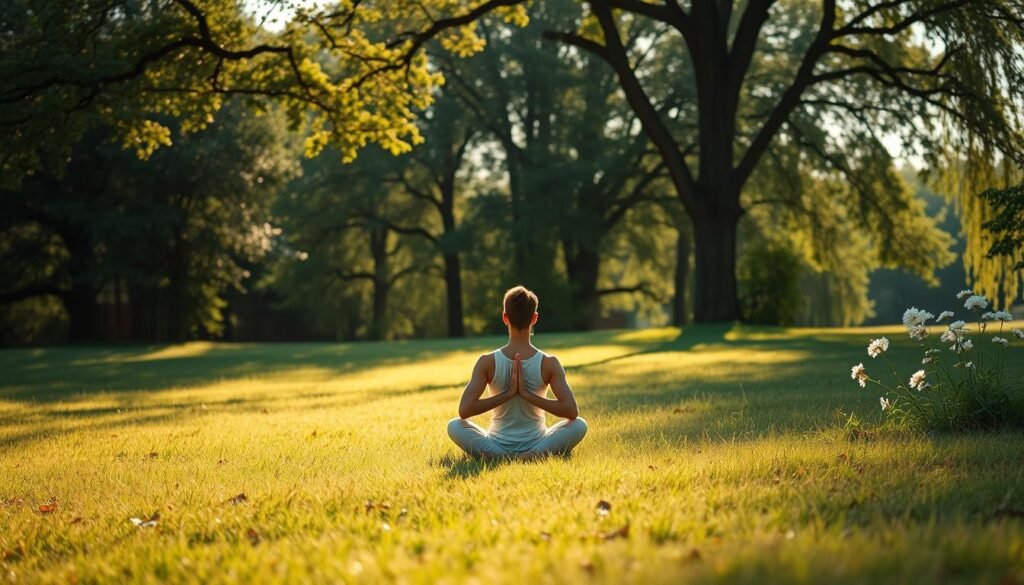A 2021 study found an interesting fact. People who are active have a 60% lower chance of feeling anxious. In the United States, over 19% of adults fight anxiety yearly. So, discovering effective ways to cope is crucial. This article will look at natural methods to manage anxiety. These methods help both the mind and overall health.
When it comes to anxiety, therapy and medicine are common treatments. However, many are now looking at natural ways for help. Things like chamomile tea and taking deep breaths are part of this. Adding mindfulness and staying active are good steps too. Before trying these natural methods, talking to a doctor is important. They can make sure it’s safe and right for you.
Key Takeaways
- A significant study indicates that physical activity reduces anxiety symptoms remarkably.
- Natural remedies such as chamomile and meditation can provide an alternative to medications.
- Incorporating lifestyle changes, including mindfulness and journaling, boosts anxiety relief.
- Consulting a healthcare provider before trying new remedies is crucial for safety.
- Having an active lifestyle significantly contributes to improved mental health.
Understanding Anxiety and Its Symptoms
Anxiety is how our body reacts to stress, marked by fear or worry. It’s crucial to know the signs of anxiety for better mental health. Recognizing symptoms early can help find effective ways to cope. Common signs are:
- Increased heart rate
- Rapid breathing
- Restlessness
- Difficulty concentrating
- Irritability
- Sleep disturbances
Knowing these symptoms is key, especially for anxiety disorders like generalized anxiety disorder and panic disorder. Generalized anxiety disorder (GAD) impacts millions, with symptoms that can last for months or years. Panic disorder causes unexpected panic attacks. And those with social anxiety might fear being judged.
Definitions and Importance
Anxiety isn’t just about symptoms. Understanding it means looking at genetic, environmental, and biochemical factors. Stress hormones like adrenaline and cortisol spike during anxious moments. They can cause physical reactions and even panic attacks. Some fears in phobia-related disorders are irrational, leading to avoidance behavior.
It’s vital to seek help for anxiety. Therapies, like cognitive behavioral therapy, are highly effective. Medications may also help. Managing anxiety well can greatly improve one’s life. To learn more on coping with anxiety, read this article.
What are Natural Ways to Deal with Anxiety?
Nearly 29% of people battle with anxiety. This shows how common this issue is. Many are choosing natural ways to fight it. They opt for methods like lifestyle modifications. These include exercising, changing their diet, and trying relaxation techniques. These methods help manage anxiety well. They also lower the risk of dependency and side effects.

Overview of Natural Remedies
There are many natural remedies that can help with anxiety. Doing exercises can really decrease anxiety feelings. If you work out at least three times a week, it helps a lot. Techniques like therapeutic massage and acupuncture work too. They tackle stress and muscle tension.
What you eat also matters when managing anxiety. Foods with omega-3s, antioxidants, and vitamins help your mind stay healthy. Herbs like chamomile, lavender, and lemon balm can make you feel relaxed. Also, sleeping for 7 to 9 hours each night helps control anxiety.
Using relaxation techniques can also ease anxiety. Exercises that involve deep breathing help your body relax more. Journaling can be helpful, especially for young people. Writing down what you feel helps you understand your emotions better.
| Remedy | Benefits | Considerations |
|---|---|---|
| Regular Exercise | Reduces anxiety, boosts mood | Engage at least 3 times a week |
| Therapeutic Massage | Eases muscle tension, lowers stress | Find a qualified practitioner |
| Acupuncture | Reduces nerve tension, aids relaxation | Consult a licensed acupuncturist |
| Herbal Remedies | Promote relaxation | Some may cause side effects |
| Deep Breathing Techniques | Stimulates relaxation response | Practice regularly for best results |
| Journaling | Helps process emotions | Consistent practice is key |
Trying these natural remedies can truly help with anxiety. They give you many choices to match your life and likes. Embracing these methods can make your mental health better. It leads to healthier ways of coping.
Mindfulness Techniques for Managing Anxiety
Mindfulness techniques are powerful for those looking to ease anxiety. They focus on being aware of our thoughts, feelings, and bodily sensations every moment. This practice can reduce stress and bring clarity to your mind, helping to control anxiety.
Practice and Benefits
By practicing mindfulness exercises like mindful breathing and body scans, we learn to be aware without being critical. These methods help us accept our feelings and not be overwhelmed by them. Studies show that practicing mindfulness daily can improve focus, sleep, and reduce job stress.
To truly benefit, it’s suggested to practice mindfulness every day for six months. This commitment helps make mindfulness a regular habit, leading to lasting emotional health improvements. With many free online guided meditations, starting is easy for anyone.
Being in nature also boosts mindfulness benefits, as being outdoors helps ease anxiety. Even a quick 10-second practice of wishing happiness to others can foster positive emotions and a sense of belonging.
Recent studies show a link between heavy social media use and increased anxiety in young people. Mindfulness can counter this by helping individuals detach from negative feelings and calm their mind. With growing evidence supporting its benefits, making mindfulness a part of daily life is key for managing anxiety and improving mental wellness.
Breathing Exercises That Help Alleviate Anxiety
Breathing exercises are key to fighting anxiety and stress. They increase oxygen flow and help you relax. By using different breathing methods daily, your mind can find peace.
Techniques and Guidelines
Stress relief techniques use special breathing patterns for relaxation. Try these methods:
- Deep Breathing: Take a deep breath through your nose. Let your belly expand. This reduces shallow chest breathing.
- Belly Breathing: Breathe in and let your abdomen fill up. Do this three to four times a day for 10 minutes.
- 4-7-8 Method: Breathe in for four seconds, hold for seven, exhale for eight. It’s like a calm pill for your nerves.
- Equal Breathing: Breathe in and out for the same time. It balances your body’s energy.
- Resonance Breathing: Inhale for six seconds and exhale for six. It eases anxiety if you do it for 10 minutes.
- Box Breathing: Inhale, hold, exhale, and hold, all for four seconds. It stabilizes your breathing.
- Pursed-Lip Breathing: Inhale for two seconds and exhale for four with pursed lips. Try it four to five times a day.
- Alternate Nostril Breathing: Breathe in through one nostril and out the other. It restores balance. Repeat up to 10 cycles.
These breathing exercises relax your nervous system and control your heart rate. They improve well-being. Regular practice helps you breathe from your diaphragm automatically in stressful times.

Meditation Practices to Promote Calmness
Meditation is now widely seen as an effective way to create calm and reduce anxiety. People can choose from different meditation types to meet their needs. We will look at various meditation approaches and their role in lessening stress and anxiety.
Types of Meditation
There are many meditation methods that ease anxiety and boost well-being. Each one uses techniques that encourage relaxation and mindfulness. Some popular kinds include:
- Guided Meditation: You follow a teacher or audio guide through calming visualizations and scenes.
- Transcendental Meditation: It involves repeating a mantra silently to achieve a peaceful state of mind.
- Loving-Kindness Meditation: This method helps develop love and compassion for oneself and others.
- Mindfulness Meditation: It focuses on being aware of the present, fostering peace within.
- Qigong and Tai Chi: These involve slow movements and meditation to boost physical health.
- Yoga: This technique combines poses, breathing exercises, and meditation for overall wellness.
Adding meditation to your routine can greatly benefit your mental and physical health. It can lower heart rate and blood pressure, improving health. The best part? No special gear is needed, so it’s easy and affordable for all.
Studies show meditation helps with anxiety, chronic pain, and sleep issues. Mindfulness-Based Stress Reduction (MBSR) is highly effective for anxiety relief. As more people discover meditation’s advantages, they’re incorporating it into their lives for a calmer existence.

Herbal Remedies That May Reduce Anxiety
Herbal remedies are becoming popular for managing anxiety. Many plants and herbs are known for their calming effects. Chamomile tea is especially recognized for its soothing impact and can help with generalized anxiety disorder.
Popular Herbal Options
Chamomile tea has been effective in studies, reducing anxiety symptoms. One study with 93 people showed that chamomile can prevent symptoms from coming back. This makes chamomile a top choice for those looking for natural relief.
Lavender, used as essential oil or supplement, can provide quick anxiety relief. However, valerian root’s effectiveness for anxiety is still uncertain, and caution is advised. Considering the correct dosage and potential side effects is important.
Ashwagandha, known for reducing stress, has shown positive results. A study reported lower stress levels in participants using 600 mg of ashwagandha. Yet, Kava kava, despite its benefits, can be risky due to serious side effects like liver damage. Always talk to a healthcare provider before trying these herbs.
Those looking for natural anxiety relief should be cautious. Herbal products aren’t strictly regulated, so it’s crucial to verify their safety. Making sure your herbal remedies are safe is key to managing anxiety effectively.
Yoga Poses for Anxiety Relief
Yoga helps reduce anxiety and increase relaxation when included in everyday life. It combines mindful movements with breathing to connect the body and mind. This makes yoga a great activity for anxiety relief. Studies show that yoga poses are really good for calming anxiety and boosting emotional strength.
Effective Yoga Practices
Child’s Pose, Downward Dog, and Legs Up the Wall are especially calming. They help physically and focus the mind on breathing. Staying present during these poses helps with anxiety management. Here’s why these practices are beneficial:
- Physical activity for anxiety: Yoga uses deep breaths to help calm you down.
- Building emotional resilience: Doing yoga often makes you less emotionally reactive and lowers stress over time.
- Accessibility: You can do yoga anywhere, making it a flexible choice for anxiety relief.
Certain breathing techniques, like pranayama, in yoga can calm your nerves and lessen stress. Each pose also exercises different muscles which promotes both physical and mental health. Below are some poses to try:
| Yoga Pose | Benefits |
|---|---|
| Child’s Pose | Relaxes and stretches the back. |
| Downward Dog | Boosts blood flow and energizes. |
| Legs Up the Wall | Eases the nervous system and reduces stress. |
| Tree Pose | Helps with balance and concentration. |
| Mountain Pose | Stabilizes and improves posture. |
Regular yoga practice can greatly help manage anxiety. Try different yoga styles like Hatha or Vinyasa to find what suits you. Adding yoga to your life offers immediate relief and long-term mental health benefits. For more on yoga’s advantages for anxiety, visit this comprehensive guide.
Cognitive Behavioral Strategies to Manage Anxiety
Cognitive-behavioral therapy (CBT) is a leading way to tackle anxiety disorders. It uses structured sessions to teach key skills for managing anxiety. Through cognitive and behavioral methods, people learn to face their fears. They challenge bad thoughts and find better ways to react to stressful situations.
CBT Techniques
CBT offers various strategies tailored to each person’s needs. Here are some main techniques used in treating anxiety:
- Exposure Therapy: This approach has individuals gradually face what they fear, lessening anxiety over time.
- Cognitive Restructuring: This helps people spot and change harmful beliefs, leading to healthier thinking.
- Behavioral Experiments: These challenge wrong beliefs with real evidence, encouraging positive thought patterns.
- Mindfulness Practices: Adding mindfulness helps improve mental health, keeping people in the present and reducing overthinking.
- Problem-Solving Skills: Learning to solve problems effectively helps individuals directly face what makes them anxious.
CBT often includes weekly sessions for 12-16 weeks, with extra sessions later to keep up progress. It also works in groups, encouraging learning from others. This structured approach gives skills to not only ease anxiety but also build strength for future challenges.
| Technique | Description | Benefit |
|---|---|---|
| Exposure Therapy | Gradual confrontation of feared situations | Reduces avoidance and anxiety over time |
| Cognitive Restructuring | Identifying and challenging negative thoughts | Promotes healthier thinking patterns |
| Behavioral Experiments | Testing the validity of irrational beliefs | Provides evidence for healthier beliefs |
| Mindfulness Practices | Staying present and reducing rumination | Enhances overall mental well-being |
| Problem Solving Skills | Strategies to tackle anxiety-inducing challenges | Empowers individuals to manage stress |
In summary, CBT’s strategies offer a strong way to fight anxiety. Engaging in CBT for anxiety not just gives quick relief. It also helps develop vital skills for long-term mental health.
Conclusion
Managing anxiety effectively takes a mix of natural remedies and lifestyle changes. Mindfulness, meditation, and exercise are key strategies. These methods not only reduce anxiety but also improve your overall health.
Our discussion stressed the value of breathing exercises, yoga, and cognitive therapy for anxiety. It’s vital to know your options and seek help when needed, especially for severe anxiety.
The path to overcoming anxiety is unique for each person. Adopting a routine of natural remedies and making smart choices can greatly improve life. For more tips on managing anxiety, check out this in-depth self-help guide.